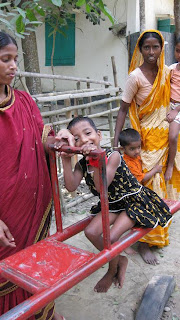The 20th of December one of the physiotherapists proudly pronounced that there will be a culture show the next day. A culture show in Dhaka, for entertaining the disabled children and all the performances were also by disabled children. This was planned in the world disability day, but was canceled last minute.
Aylin and Roos wanted to go to this culture show! Roos doubted if she would go but Aylin couldn’t go because she was still too ill. Eventually Roos went on her own to Dhaka with a bus full of disabled children.
Since the bus also carried some of the children that would perform, we arrived very early. This way Roos could have a look on the Dhaka University, where also the culture show took place. The best university of Bangladesh looked very ‘old school’. Furthermore Roos did not have the time to look around since the debate was going to start.
There was a lot of press present which surprised Roos. Eventually she ended up in two news programs. But the most important thing was that the children seemed to enjoy themselves (except for the debate part). The culture show contained singing, dancing and a fashion show. It was nice to experience, and it made Roos a bit proud.
Aylin and Roos wanted to go to this culture show! Roos doubted if she would go but Aylin couldn’t go because she was still too ill. Eventually Roos went on her own to Dhaka with a bus full of disabled children.
Since the bus also carried some of the children that would perform, we arrived very early. This way Roos could have a look on the Dhaka University, where also the culture show took place. The best university of Bangladesh looked very ‘old school’. Furthermore Roos did not have the time to look around since the debate was going to start.
There was a lot of press present which surprised Roos. Eventually she ended up in two news programs. But the most important thing was that the children seemed to enjoy themselves (except for the debate part). The culture show contained singing, dancing and a fashion show. It was nice to experience, and it made Roos a bit proud.











